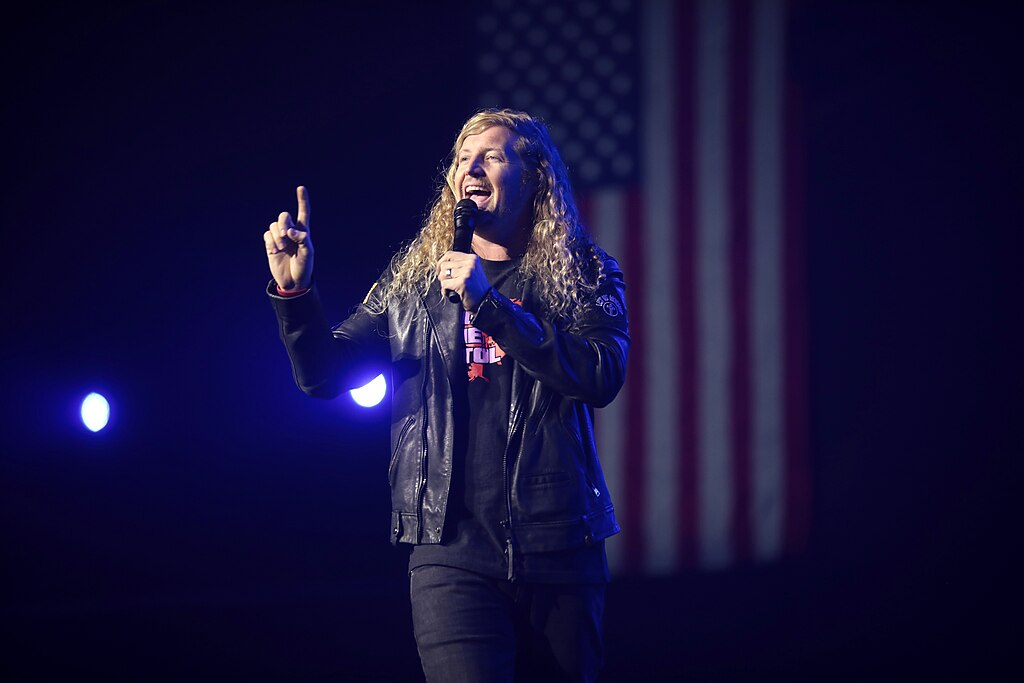Canadian cities have increasingly rejected U.S. Christian musician Sean Feucht in recent days, amid protests and permit cancellations tied to his controversial political and religious views. Now, a church has been fined for hosting him in concert.
After multiple cities revoked venues, his concert in Montreal went ahead at a church that agreed to host him last minute. As protesters gathered outside, one threw a smoke bomb inside the church.
The City of Montreal then fined the host church $2,500, saying that the church did not have a permit to host a concert.
Who is Sean Feucht and how did he rise to prominence?
Sean Feucht is a U.S. worship leader, formerly associated with Bethel Church, and gained rising recognition for launching large outdoor worship rallies during the COVID‑19 pandemic.
Branded as the Let Us Worship movement, these gatherings challenged lockdown restrictions and quickly attracted attention during Black Lives Matter protests in 2020.
Over time, Feucht became linked with Christian nationalist and far-right circles, including the MAGA movement, and has advocated for a fusion of church and state governance.
He also ran for Congress as a Republican in California and spoke alongside political allies at events like the ReAwaken America Tour.
Controversial rhetoric
In 2021, after an event in Portland, Feucht wrote in a Facebook post:
“Help me GIVE THANKS to our security team (half of them here) tonight in Portland … These are all ex‑military, ex‑police, private security and most importantly LOVERS OF JESUS and freedom. If you mess with them or our 1st amendment right to worship God — you’ll meet Jesus one way or another. 😉”
Many Christian leaders spoke out against the post that alluded to using deadly force against opponents.
>
Feucht has also described LGBTQ+ identities as "demonic" and drag performers as "perverting the minds of children."
Those statements have drawn backlash even from within the Christian community. A group of pastors from the U.S.A.'s Pacific Northwest sent letters to lawmakers in 2023 protesting a Feucht tour in response.
Critics also pointed to symbolic insensitivity during a 2023 Let Us Worship event in Spokane, Washington. The city’s mayor attended, even as wildfires ravaged the region, drawing sharp criticism for politicizing worship during a humanitarian crisis
Allegations of financial misconduct
In June 2025, five former senior staff from Sean Feucht’s ministries accused him of financial mismanagement, alleging he diverted donations, failed to track expenses, and underpaid or misclassified workers.
The whistleblowers, who posted their claims on a dedicated website, called for Feucht to be removed from leadership and financial control roles.
Feucht’s organizations, including Burn 24-7 and Let Us Worship, reportedly saw revenue jump to over $5 million in 2020.
The report also documents Feucht’s ownership of 10 personal and ministry-related properties across multiple U.S. states.
But after reclassifying as churches, they stopped disclosing financial records to the IRS.
MinistryWatch president Warren Cole Smith said the lack of transparency leaves donors in the dark about how funds are used.
Among the claims are that ministry credit cards were used for personal expenses and that some volunteers worked full-time hours without proper compensation or reporting. Feucht has not responded publicly to the allegations.
Canadian backlash
Feucht’s Canadian tour, Revive in 25, was scheduled across eastern cities in July. But planned stops in Halifax, Charlottetown, Moncton, Quebec City, Gatineau and Vaughan were cancelled due to public pressure, safety concerns and opposition from municipal leaders.
In Halifax, federal MP Andy Fillmore joined residents in calling for a venue cancellation.
Parks Canada ultimately revoked the concert permit, saying the event raised "public safety concerns" and conflicted with inclusive values.
In Quebec City, Transition Quebec councillor Jackie Smith said the city should not support "propaganda groups that insult our communities and seek to divide us on the basis of our identities."
Criticism from within the Christian community
While Sean Feucht continues to draw support from some evangelical and charismatic circles, a growing number of Christian leaders have voiced serious concerns about his approach.
Critics argue that his overt embrace of Christian nationalism and repeated portrayal of worship as a spiritual weapon align more with political power than pastoral care, thereby distorting the gospel message.
Other critics, including former insiders from his own ministry, have warned of a developing "cult of personality" around Feucht. Scholars such as Emily Snider Andrews describe a model in which charismatic figures emerge as “worship influencers,” commodifying revival and reducing accountability within ministry leadership
Additionally, a coalition of faith leaders associated with the New Apostolic Reformation movement has dismissed Feucht’s events as politically opportunistic.
Among their criticisms: exaggerating attendance figures, politicizing worship gatherings, and leveraging a narrative of Christian persecution to motivate supporters—a strategy described by one observer as "nefarious."
Support from Christian leaders
Despite growing criticism, Feucht retains support from several high-profile figures within evangelical and charismatic circles.
Leaders such as Tony Perkins of the Family Research Council and pastor Che Ahn of Harvest Rock Church have publicly praised his efforts to "stand for biblical values" in the public square. Supporters often frame his work as bold spiritual leadership in a hostile cultural climate.
Many defend Feucht’s worship events as peaceful expressions of religious freedom and revival. They argue that the backlash he faces, including protest and concert cancellations, is evidence of increasing intolerance toward conservative Christian voices.
In response to recent financial and ideological criticism, allies have dismissed the allegations as politically motivated or spiritually misguided, saying Feucht is being targeted for his outspoken faith and cultural engagement.
Why protests now?
As Feucht arrived in Canada, municipal governments and private venues faced pressure to cancel his performances.
His rhetoric and political alignment sparked concern that his events could attract conflict, intimidate communities or promote exclusion.
Feucht, however, has portrayed the backlash as persecution.
"We’ve had venues cancelled. We’ve been threatened … The show is going on, baby. God is with us," he said in a recent social media video.
